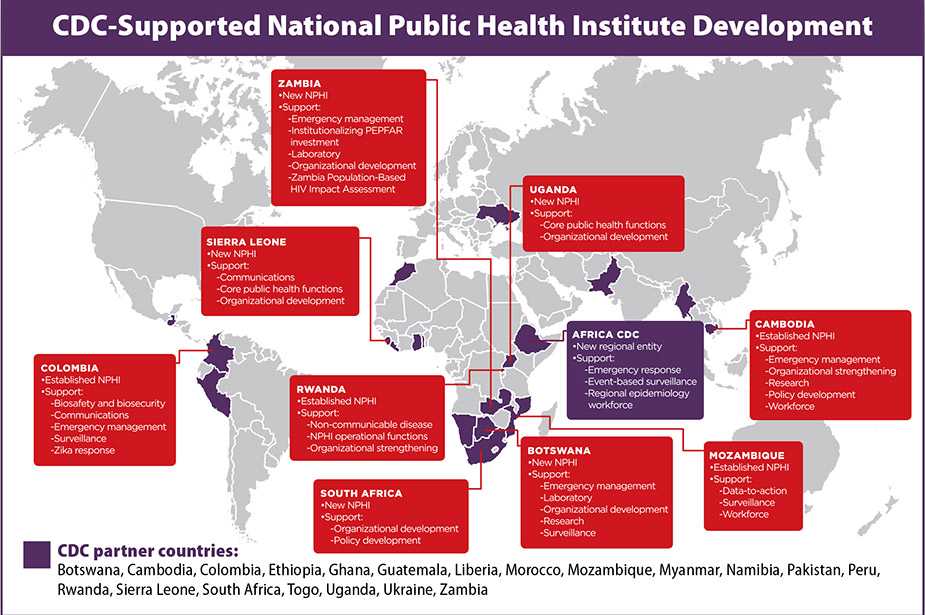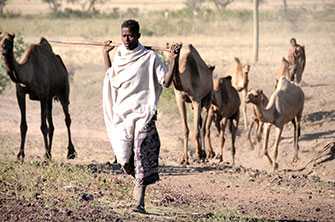National Public Health Institutes Program: Where We Work

One size does not fit all. NPHIs vary in size, scope, and availability of resources, and CDC’s role varies based on the context in which we are working. Here are some highlights of CDC’s NPHI engagement with partner countries.
Africa: Providing technical assistance to the African Union to develop and launch the Africa Centres for Disease Control and Prevention (Africa CDC), including technical assistance to train Africa CDC epidemiologists in surveillance, preparedness and response; establish the Surveillance and Response Unit (ASRU) to conduct event-based surveillance and emergency preparedness and response activities; and provide technical input for the establishment of five Africa CDC Regional Collaborating Centers.
“Learning from the Ebola virus disease outbreak, my Government is taking action to build a resilient health system that is well positioned to prevent, detect, and respond to any public health threat of either the same or of similar nature to Ebola…An Emergency Operational Centre and a National Public Health Agency for capacity building have been established…to coordinate field activities during outbreaks.”
– Dr. Ernest Bai Koroma, President of Sierra Leone, in an address to the Sierra Leonean Parliament
Botswana: Supporting Botswana with strategic planning and legislation development as they move toward establishing an NPHI.
Colombia: Supporting Colombia’s Instituto Nacional de Salud (INS) to enhance laboratory safety and security; develop a national public health research agenda; improve the quality and availability of national public health data; and strengthen national surveillance of infectious diseases.
Ethiopia: Supporting the Ethiopia Public Health Institute (EPHI) to build capacity in laboratory system strengthening and public health workforce development.
Ghana: Supporting the Ghana Heath Service to articulate a vision and a strategic plan for the formation of the Ghana National Public Health Institute and helping them strengthen their weekly epidemiological bulletin.
Guatemala: Supporting Guatemala’s Centro de Control de Enfermedades (CDCE) to build capacity in public health research, policy development, emergency response, disease surveillance, and laboratory system strengthening.
Liberia: Supporting Liberia’s Ministry of Health in transitioning the newly-established National Public Health Institute of Liberia (NPHIL) into a fully functional agency, with a goal of coordinating the country’s public health functions to ensure a more efficient and effective system for rapid response to future infectious disease outbreaks.
Morocco: Supporting the government of Morocco in planning the development of an NPHI. CDC has helped map existing public health surveillance functions and participated in an WHO/EMRO led assessment of the public health laboratory system, which will help define the strategic direction and priorities for NPHI development.

Neil Palmer (CAIT): Colombia's Tolima Department
Mozambique: Supporting Mozambique’s Instituto Nacional de Saudé (INS) to strengthen surveillance for national public health reporting; build workforce capacity to fill strategic gaps in the public health system; strengthen capacity for early detection of emerging infectious diseases; and improve collection of data on non-communicable diseases.
Myanmar: Supporting Myanmar with strategic planning as they move toward establishing a new NPHI, the Myanmar Centers for Disease Control (Myanmar CDC), to strengthen disease control, response, workforce, and laboratory capacities.
Namibia: Supporting Namibia with strategic planning as they move toward establishing a new NPHI, the Namibia Institute of Public Health (NIPH).
Nigeria: Strengthening the Nigeria Centre for Disease Control (NCDC) as the country’s focal point for public health for functions including disease prevention and control; public health emergency preparedness and response; and public health laboratories.
Pakistan: Supporting Pakistan’s Ministry of National Health Services, Regulations, and Coordination (MNSHR) in defining functions and operations for a Pakastani NPHI, which would engage in disease surveillance, risk assessments, disease response, and epidemic control activities.
Rwanda: Supporting Rwanda’s National Institute of HIV/AIDS, Disease Prevention, and Control (IHDBC) to improve internal cross-program coordination and communication, and also to stand up its newly created non-communicable diseases division.
Sierra Leone: Supporting Sierra Leone’s efforts to structure their public health functions and strengthen their overall capacity to prevent, detect, and respond to health concerns following their recent experience with Ebola Virus Disease.
South Africa: Supporting South Africa’s Department of Health in establishing their National Public Health Institute of South Africa (NAPHISA), which which will bring together existing units from across the government that address communicable and non-communicable diseases, injury prevention, cancer registry, national reference laboratories, and occupational health. This effort will improve the coordination and efficiency of public health in South Africa.

Hardeep Sandhu: Ethiopia herder 2011 PCV20 introduction
Uganda: Providing technical assistance to the Ministry of Health to support the development of the Uganda National Institute of Public Health. These efforts are closely woven together with Global Health Security Agenda efforts.
Ukraine: Providing technical assistance to Ukraine’s Ministry of Health to establish the Ukranian National Center for Public Health (UNCPH). This new institute was authorized by the Ukrainian Cabinet of Ministers in September 2015, and was the result of a merger of several existing government entities into one NPHI responsible for ensuring effective allocation of limited public health resources for maximum public health impact.
Zambia: Supporting the establishment of the Zambia National Public Health Institute (ZNPHI) through PEPFAR support. This initiative will demonstrate how NPHIs can effectively institutionalize key HIV-related strategic information activities, while also demonstrating improvements in national capacity to carry out essential public health functions.
- Page last reviewed: June 8, 2017
- Page last updated: June 8, 2017
- Content source:


 ShareCompartir
ShareCompartir